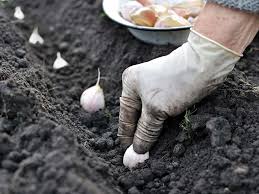How to grow garlic from a bulb? Some things to know before starting.
Preparation before planting
- Remove weeds and dig the soil. Add organic matter such as compost, peat moss, hay, fertilizer, or any untreated plant residue.
- Plow or dig the soil to make it lose and “fluffy.” Root crops grow best in light, non-compacted soils. Garlic cannot grow in concrete.
- If it is sandy or clay, please add organic matter. Do not add sand to the clay; otherwise, it will form cement. Organic matter will hold the moisture in the sand and destroy the clay.
Planting method
Divide the garlic bulbs into individual cloves before planting. When separating the cloves, be careful not to damage the cloves. Here is a little tip to prevent rotting in the soil: soak the cloves in a glass jar containing an equal amount of baking soda and organic liquid seaweed for 2 hours. Growing garlic is relatively simple. Clove should be planted with the pointed end facing up and the blunt end facing down. Separate the cloves by 4-6 inches and plant them at a depth twice as deep as they are. The rows should be spaced one foot apart. Push each clove 1-2 inches into the ground, fix the surrounding soil, and water the bed if it is dry.
How to grow garlic at home
Learn about how to grow garlic from a bulb, so how do we grow garlic at home?
Growing conditions
- Well-drained soil
- Soil pH is 6.0 to 7.0
- Least weed competition
- Large amounts of organic matter
- One inch of water is needed during the bulb formation process from mid-May to July

Where to grow garlic?
Where to grow garlic? Choose a place with plenty of sun, fertile soil, and good drainage. Garlic bulbs should be planted where it has not been used recently for garlic or other plants in the onion family. Do not plant garlic bulbs in areas where water may accumulate around the roots, causing them to rot or become diseased. Please make sure that the site is not treated with any long-acting herbicides. The herbicide will hinder or kill any garlic or vegetables you are trying to grow in the area.
When to grow garlic bulbs?
When to grow garlic? The best sowing time is autumn in the southern hemisphere or spring in the northern hemisphere for obtaining higher yields and larger cloves. But don’t be disappointed! You can grow garlic bulbs at any time of the year, but the bulb size may be smaller. Once the soil temperature drops to about 60 degrees Fahrenheit, the roots of the garlic cloves will begin to germinate and begin to anchor the plants. In Australia, the seeds are usually planted in March/April.
Before planting, if necessary, lime the soil. The fertilizer is a few inches below where the garlic will be placed. The roots of the cloves are down, 2 inches deep, 2 inches apart, and the rows are about 1 foot apart. You can also grow garlic bulbs on a mound 15 cm high and 20 cm wide at the bottom. Plant garlic cloves in these mounds, 15-20 cm apart and 7-10 cm deep. Since the soil is slightly elevated, it will not get wet, so the possibility of garlic rot is less.
Which soil is best for garlic bulbs?
Since garlic is a root crop, it needs fertile, loose soil and good drainage. Silty loam is one of the best soils for growing garlic bulbs. Garlic will rot in moist soil and will not grow well. If the soil is heavy, it is best to plant garlic in spring. This type of soil tends to hold a lot of moisture, especially in winter, which can cause garlic cloves to rot. Then, you can plant them in the spring when the soil is slightly dry.
The care of garlic growing process
After planting, lay down the protective straw and use chopped leaves or grass clippings as a mulch. In cold winters, the thickness of the covering should be about 4 inches. The mulch will alternate freezing and thawing to prevent the garlic roots from being poured out of the ground. In mild climates, light mulch can be used to control the growth of weeds in winter. At the end of spring, some varieties of garlic produce flower stem with small bulbs. Cut off these stems. This will ensure that all the food produced by the plant will enter the garlic bulb itself rather than the bulb cluster. Insects rarely destroy garlic, but it needs to be weeded. Add another fertilizer to garlic in early spring and mid-May. As the spring weather becomes dry, water the garlic bulbs to a depth of two feet every eight to ten days. As mid-June approaches, gradually reduce watering.
